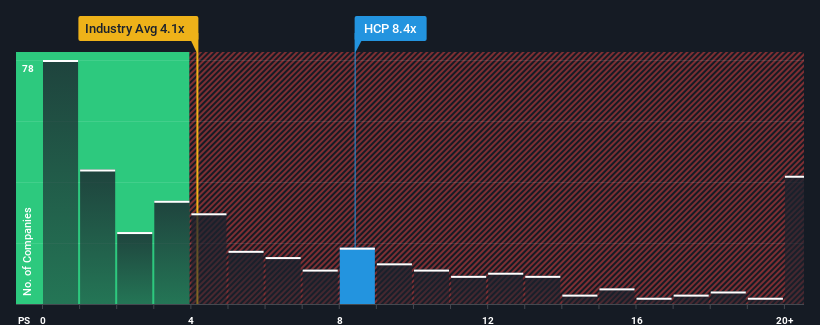
With a price-to-sales (or "P/S") ratio of 8.4x HashiCorp, Inc. (NASDAQ:HCP) may be sending very bearish signals at the moment, given that almost half of all the Software companies in the United States have P/S ratios under 4.1x and even P/S lower than 1.6x are not unusual. Although, it's not wise to just take the P/S at face value as there may be an explanation why it's so lofty.
View our latest analysis for HashiCorp

What Does HashiCorp's Recent Performance Look Like?
With revenue growth that's superior to most other companies of late, HashiCorp has been doing relatively well. It seems that many are expecting the strong revenue performance to persist, which has raised the P/S. However, if this isn't the case, investors might get caught out paying too much for the stock.
If you'd like to see what analysts are forecasting going forward, you should check out our free report on HashiCorp.How Is HashiCorp's Revenue Growth Trending?
The only time you'd be truly comfortable seeing a P/S as steep as HashiCorp's is when the company's growth is on track to outshine the industry decidedly.
Taking a look back first, we see that the company grew revenue by an impressive 23% last year. The strong recent performance means it was also able to grow revenue by 175% in total over the last three years. Therefore, it's fair to say the revenue growth recently has been superb for the company.
Looking ahead now, revenue is anticipated to climb by 16% per year during the coming three years according to the analysts following the company. That's shaping up to be similar to the 15% per year growth forecast for the broader industry.
With this in consideration, we find it intriguing that HashiCorp's P/S is higher than its industry peers. It seems most investors are ignoring the fairly average growth expectations and are willing to pay up for exposure to the stock. These shareholders may be setting themselves up for disappointment if the P/S falls to levels more in line with the growth outlook.
What Does HashiCorp's P/S Mean For Investors?
We'd say the price-to-sales ratio's power isn't primarily as a valuation instrument but rather to gauge current investor sentiment and future expectations.
Given HashiCorp's future revenue forecasts are in line with the wider industry, the fact that it trades at an elevated P/S is somewhat surprising. Right now we are uncomfortable with the relatively high share price as the predicted future revenues aren't likely to support such positive sentiment for long. This places shareholders' investments at risk and potential investors in danger of paying an unnecessary premium.
It's always necessary to consider the ever-present spectre of investment risk. We've identified 2 warning signs with HashiCorp, and understanding them should be part of your investment process.
If companies with solid past earnings growth is up your alley, you may wish to see this free collection of other companies with strong earnings growth and low P/E ratios.
Valuation is complex, but we're here to simplify it.
Discover if HashiCorp might be undervalued or overvalued with our detailed analysis, featuring fair value estimates, potential risks, dividends, insider trades, and its financial condition.
Access Free AnalysisHave feedback on this article? Concerned about the content? Get in touch with us directly. Alternatively, email editorial-team (at) simplywallst.com.
This article by Simply Wall St is general in nature. We provide commentary based on historical data and analyst forecasts only using an unbiased methodology and our articles are not intended to be financial advice. It does not constitute a recommendation to buy or sell any stock, and does not take account of your objectives, or your financial situation. We aim to bring you long-term focused analysis driven by fundamental data. Note that our analysis may not factor in the latest price-sensitive company announcements or qualitative material. Simply Wall St has no position in any stocks mentioned.
About NasdaqGS:HCP
HashiCorp
Engages in the provision of multi-cloud infrastructure automation solutions worldwide.
Flawless balance sheet with reasonable growth potential.


